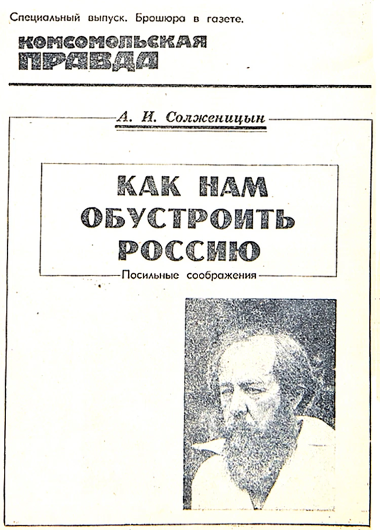Filed Under: Print > Political advertising > Rebuilding Russia
Rebuilding Russia

Aleksandr Solzhenitsyn, “Kak nam obustroit’ Rossiiu,” Komsomol’skaia pravda, September 1990.
As the Soviet Union’s internal weakness became clear in mid-1990, the expatriate dissident and Gulag chronicler Alexander Solzhenitsyn (1918-2008) wrote down his vision for Russia’s path forward. Published later that year and translated as Rebuilding Russia (the original Kak nam obustroit’ Rossiiu is closer to “How we are to set up Russia”), his brochure begins by proclaiming that “time has run out for communism. But its concrete edifice has not yet crumbled. And we must take care not to be crushed beneath its rubble instead of gaining liberty.” The first condition for realizing Solzhenitsyn’s vision for a new Russia is ethnic homogeneity. “It must be declared loudly, clearly, and without delay,” he wrote, that all the non-Russian republics of the Soviet Union “will be separated off unequivocally and irreversibly.” The remainder would be a Russian Union (Rossiiskii soiuz) comprising Russia, Ukraine, and Belarus.
By the time the pamphlet appeared, history had outpaced the publication process, and the dream of an ethnically Slavic super state seemed increasingly far-fetched. Some of Solzhenitsyn’s other insights, however, bear up better in hindsight. Although he advocated for individual ownership, for instance, he saw the dangers of too-rapid privatization. Agricultural land, he suggested, should be handed over from collective farms to decentralized local councils (zemstva) that would, in turn, parcel out territory to individual farmers. Natural resources, especially, would invite an “inequitable sell-off” to “foreign capitalists.” “Western capital must not be lured in on terms that are advantageous to it but humiliating to us, in come-and-rule-over-us style,” the author warned. “Any thoughtless wholesale adoption of a foreign type of economy would also have ruinous consequences.”
Solzhenitsyn’s pamphlet was widely read and discussed, but many commentators found his perspective irrelevant to emerging realities. As his economic warnings went unheeded, post-Soviet Russia found itself in thrall to Western capital, with the “wholesale adoption of a foreign type of economy” he had warned against indeed proving disastrous. Ironically, the very disaster he foresaw laid the groundwork for Putin’s neo-imperialism, a vision that shares much with Solzhenitsyn’s aspirations for an ethnically Slavic Russian Union.
By the time the pamphlet appeared, history had outpaced the publication process, and the dream of an ethnically Slavic super state seemed increasingly far-fetched. Some of Solzhenitsyn’s other insights, however, bear up better in hindsight. Although he advocated for individual ownership, for instance, he saw the dangers of too-rapid privatization. Agricultural land, he suggested, should be handed over from collective farms to decentralized local councils (zemstva) that would, in turn, parcel out territory to individual farmers. Natural resources, especially, would invite an “inequitable sell-off” to “foreign capitalists.” “Western capital must not be lured in on terms that are advantageous to it but humiliating to us, in come-and-rule-over-us style,” the author warned. “Any thoughtless wholesale adoption of a foreign type of economy would also have ruinous consequences.”
Solzhenitsyn’s pamphlet was widely read and discussed, but many commentators found his perspective irrelevant to emerging realities. As his economic warnings went unheeded, post-Soviet Russia found itself in thrall to Western capital, with the “wholesale adoption of a foreign type of economy” he had warned against indeed proving disastrous. Ironically, the very disaster he foresaw laid the groundwork for Putin’s neo-imperialism, a vision that shares much with Solzhenitsyn’s aspirations for an ethnically Slavic Russian Union.